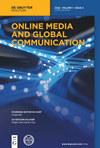Scientific Disinformation in Times of Epistemic Crisis: Circulation of Conspiracy Theories on Social Media Platforms
引用次数: 3
Abstract
Abstract The spread of disinformation about science in social media has been a major concern worldwide, especially at a time of crisis in which all institutions that produce knowledge and truth, including science, are delegitimized or discredited by society. Given this, the purpose of this research is to map the circulation of information on the most frequent conspiracy theories in Brazil, seeking to identify actors, discourses, and interactions on different digital platforms. Using a mixed methodology for identifying informational flows among supporters of conspiracy theories on Facebook, WhatsApp, and YouTube, the results show that, even though there is distrust about the relationship between science, government and industry, scientific authority is a symbolic capital of extreme importance for the circulation of information on conspiracy theories related to science.认知危机时代的科学虚假信息:阴谋论在社交媒体平台上的传播
摘要社交媒体上关于科学的虚假信息的传播一直是全世界关注的一个主要问题,尤其是在危机时刻,包括科学在内的所有产生知识和真相的机构都被社会剥夺了合法性或名誉。有鉴于此,本研究的目的是绘制巴西最常见阴谋论的信息流通图,试图识别不同数字平台上的参与者、话语和互动。使用一种混合方法来识别脸书、WhatsApp和YouTube上阴谋论支持者之间的信息流,结果表明,尽管人们对科学、政府和行业之间的关系不信任,但科学权威是与科学相关的阴谋论信息流通的极为重要的象征资本。
本文章由计算机程序翻译,如有差异,请以英文原文为准。
求助全文
约1分钟内获得全文
求助全文
来源期刊

Online Media and Global Communication
Communication, Media Studies, Internet Studies, International Studies, International Relations-
自引率
0.00%
发文量
0
期刊介绍:
Online Media and Global Communication (OMGC) is a new venue for high quality articles on theories and methods about the role of online media in global communication. This journal is sponsored by the Center for Global Public Opinion Research of China and School of Journalism and Communication, Shanghai International Studies University, China. It is published solely online in English. The journal aims to serve as an academic bridge in the research of online media and global communication between the dominating English-speaking world and the non-English speaking world that has remained mostly invisible due to language barriers. Through its structured abstracts for all research articles and uniform keyword system in the United Nations’ official six languages plus Japanese and German (Arabic, Chinese, English, French, Russian, Spanish, Japanese, and German), the journal provides a highly accessible platform to users worldwide. Its unique dual track single-blind and double-blind review system facilitates manuscript reviews with different levels of author identities. OMGC publishes review essays on the state-of-the-art in online media and global communication research in different countries and regions, original research papers on topics related online media and global communication and translated articles from non-English speaking Global South. It strives to be a leading platform for scientific exchange in online media and global communication.
For events and more, consider following us on Twitter at https://twitter.com/OMGCJOURNAL.
Topics
OMGC publishes high quality, innovative and original research on global communication especially in the use of global online media platforms such as Facebook, TikTok, YouTube, Twitter, Instagram, WhatsApp, Weibo, WeChat, Wikipedia, web sites, blogs, etc. This journal will address the contemporary concerns about the effects and operations of global digital media platforms on international relations, international public opinion, fake news and propaganda dissemination, diaspora communication, consumer behavior as well as the balance of voices in the world. Comparative research across countries are particularly welcome. Empirical research is preferred over conceptual papers.
Article Formats
In addition to the standard research article format, the Journal includes the following formats:
● One translation paper selected from Non-English Journals that with high quality as “Gems from the Global South” per issue
● One review essay on current state of research in online media and global communication in a country or region
 求助内容:
求助内容: 应助结果提醒方式:
应助结果提醒方式:


